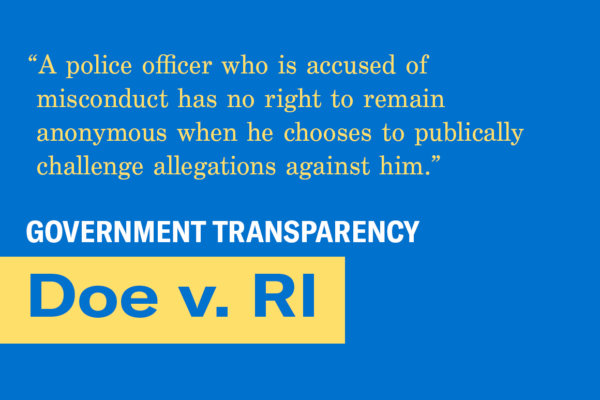Representing the Black Lives Matter RI PAC (BLM RI PAC), the community advocacy group Direct Action for Rights and Equality (DARE), and the ACLU of Rhode Island, ACLU of Rhode Island cooperating attorneys today filed a motion in R.I. Superior Court challenging a former state trooper’s attempt to proceed anonymously in suing the State Police after he was fired for allegedly not reporting to work one day because he was too intoxicated.
In seeking to intervene in the case in order to ask the court to either dismiss the lawsuit or require the trooper to include his name in the court papers, the organizations argue that “the presumption against allowing a litigant to proceed under a pseudonym applies especially strongly against a public official when he chooses to file suit in court over a matter involving official misconduct and government operations.”
The ex-trooper, who filed the suit as “John Doe” earlier this year, first received a two-day suspension and an additional probationary period for failing to notify superiors that he was dating a subordinate. A few weeks later, he was purportedly found “heavily intoxicated” on a day he failed to show up to work, and this prompted his termination. Doe’s suit claims that his firing violated the state’s controversial Law Enforcement Officers’ Bill of Rights (LEOBOR), a statute providing police strong protections against discipline. DARE and BLM RI PAC are outspoken opponents of LEOBOR and have urged its repeal, and have also both been active in efforts to promote greater police accountability.
In noting that “the constitutionally-protected principle of judicial openness requires that litigants ordinarily must proceed in their own names,” the court brief, filed by ACLU of RI cooperating attorneys Jared Goldstein, a Roger Williams University School of Law professor, and Lynette Labinger argues:
This case challenges the actions by a government agency responding to allegations of official misconduct by a public official acting in his official capacity. As is well-established, the public has a profound interest in monitoring the workings of its government. Although the plaintiff may have been able to keep personnel decisions about him private, he chose instead to publicly challenge the basis for his dismissal in open court. He cannot simultaneously attempt to clear his name while also hiding his name from the public. To be sure, the case involves potentially embarrassing allegations that the plaintiff committed official misconduct, but the possibility of embarrassment does not justify shielding the identity of a public official from the public that he is sworn to serve.
In requesting to intervene in the case, today’s court filing asks the court to “require the plaintiff to withdraw his complaint or amend it to use his own name.”
DARE interim executive director Christopher Samih-Rotondo said today: “In the context of well-publicized cases of police brutality, misconduct, and flagrant disregard for the public's trust and, the very lives of Black, Indigenous, and people of color, holding officers accountable for their actions is an essential component of the popular demand for justice in the present, and liberation in the near future. As a public servant, this state trooper must stand behind the claims he makes in attempting to get justice through the court system, just as anyone in DARE's community would be forced to do. The time for special protection, anonymity, or the absence of accountability for those who wear a badge is over.”
BLM RI PAC executive director Harrison Tuttle added: “The officer referred to as John Doe seeks to avoid basic transparency, which is empowered by the Law Enforcement Officers' Bill of Rights by providing a pathway to granting his wish. The Law Enforcement Officers’ Bill of Rights, when applied to more severe cases of personal wrongdoing, enables a two class system of law enforcement. We cannot continue to trust a system where police are not penalized for failing to uphold the laws they are trusted to enforce.”
ACLU of RI cooperating attorney Jared Goldstein said: “This motion makes a simple point: The public has a right to know the names of people bringing suit in Rhode Island courts. That right especially applies when a public official goes to court to challenge allegations of official misconduct. A police officer who is accused of misconduct has no right to remain anonymous when he chooses to publicly challenge allegations against him.”

